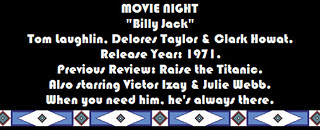
Review #1196: Billy Jack.
Cast:
Tom Laughlin (Billy Jack), Delores Taylor (Jean Roberts), Clark Howat (Sheriff Cole), Victor Izay (Doctor), Julie Webb (Barbara), Debbie Schock (Kit), Teresa Kelly (Carol), Lynn Baker (Sarah), Stan Rice (Martin), David Roya (Bernard Posner), John McClure (Dinosaur), Susan Foster (Cindy), Susan Sosa (Sunshine), and Bert Freed (Mr. Stuart Posner) Directed by Tom Laughlin.
Review:
You may perhaps wonder what exactly is Billy Jack? Well, it sure seems to think it is an action/drama, and its main character is a half-Native American (just go with it) Vietnam veteran that happens to be a Green Beret along with an expert in hapkido who decides to help defend a hippie-themed Freedom School from the other people in town. It sounded a bit ridiculous when I first heard of the premise, and the final product proves to be a strange curiosity, even if it is wildly uneven. Laughlin utilized three different pseudonyms in place of credit for his work as director, producer, and writer (for which he co-wrote with his wife Delores Taylor). Laughlin wrote the screenplay for the film in 1954, inspired by the treatment of Native Americans in Taylor's hometown of Winner, South Dakota. He served as an actor on numerous television programs sprinkled with starring roles such as The Delinquents (1957) before his first directing job with The Young Sinner (1965). He spent years on running a Montessori preschool in Santa Monica, California before it went bankrupt before finally getting a chance to bring the character of Billy Jack to the screen in 1967. The Born Losers was a motorcycle gang movie that took advantage of the popularity of outlaw biker films of the time that was distributed by American International Pictures; the film proved to be a hit, earning millions in rentals. It tries to tell the story of a pacifist loner who tries to hold in his violent urges but can't resist when dealing with prejudice - responding with violence and beating tons of guys with his feet. The film had distribution problems, with AIP and 20th Century Fox both dropping out of distributing the feature before Warner Bros. stepped in. Despite that, Laughlin felt the marketing of the film was not satisfactory, so he decided to re-release it himself in 1973. Made on a budget of $800,000, the movie ultimately turned out to be a success, making millions and being popular with portions of the youth, which led to two sequels (The Trial of Billy Jack and Billy Jack Goes to Washington) released in the decade, although the latter did not have a wide release.
If one is expecting an action flick, they may find themselves a bit disappointed. It is more of a heavy handed piece on numerous issues of the time that seems more designed for the PBS crowd (for which I occasionally call myself part of). It is a film that basks itself in a mix of cynicism and optimism that makes for an uneven experience, as if the passion to make a big statement issue piece outweighed the ultimate result on an entertainment level. I can't say that it actually is a film I can really recommend as something good, but it could serve as a curiosity piece for people wanting something different. It's hard to bash the acting, since some of the actors were amateurs (one of whom being a babysitter for the family prior to being hired for the film); Laughlin is nice to see with his loner character, although he isn't really in the film too much, with the school having more of an emphasis, for better or worse. At least the hapkido sequence is fun. Sure, the shot of him smacking a guy's face with his foot is actually Master Bong Soo Han doing the kick, but it is a pretty amusing sequence nonetheless. Taylor is fairly interesting, being quietly effective while playing the other side of the coin of the pacifism the film shows (or at least tries to show). Roya is alright as the only real main adversary shown through the film, and even then the film doesn't really have much of a hero-villain conflict. For a movie that sure likes to have focus on the kids of the school, it doesn't really have a character worth spending much attention on. I do wonder how the first film is in comparison to this. It is a free-spirit kind of movie that goes all over the place, from having sequences involving a town hall meeting moving into them going to the school and doing some improv to Billy Jack compelling someone to drive their car into a lake by fear to the ultimate climax, which feels very soft with its resolution by the time of the last minute of the 114 minute run-time. This is a strange film, having a message splintered throughout numerous soapboxes that try to grab the attention of its audience that surely had its captivating allure back in the 1970s for certain groups. For me, I just see a movie that is okay, doing fine with some of its intentions while also sometimes feeling like a chore, with its action parts (although perhaps a bit cliche) sticking out just as well as the parts where it tries to espouse about non-violence - for better or worse. If you're big on having a different time with movies by people outside the usual fare of dramas with sprinkles of action, you might have something worth going on. I can find an appreciation for someone who persists on to make a film in their vision (whether with a budget to spare or not), even if I find the film to be a bit unwieldy with its ambitions as is the case here
Overall, I give it 6 out of 10 stars.

No comments:
Post a Comment